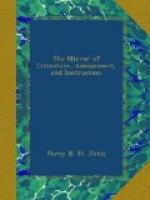Hobbes remained at Chatsworth until a very short time before his death. The Earl of Devonshire and his family were removing to Hardwick Hall in the same county, and Hobbes, who felt his days were fast drawing to a close, was anxious to be near them in his last moments; his journey, though short, was accompanied with both pain and inconvenience: he travelled on a feather bed, and in a few days after his arrival at Hardwick a paralysis terminated his existence on the 4th of December, 1679.
* * * * *
MANNERS & CUSTOMS OF ALL NATIONS.
* * * * *
ANCIENT PASTIMES.
From early records it appears that the amusements of our ancestors had a direct tendency to utility; since nearly all their recreations were resolvable into public defence against the attacks of an enemy. The “play at ball was,” says Fitz-Stephen, “derived from the Romans, and was the common exercise of every schoolboy.” The intention of this game was to make the young men active, nimble, and vigourous, whenever they should be called upon to fight the battles of their country. The necessity of the above accomplishments must be obvious to all who are the least acquainted with their manner of fighting.
Another species of exercise was truly martial. It is related by Fitz-Stephen thus: “Every Friday in Lent a company of young men enter the field on horseback, conducted by the best horsemen. Then march forth the sons of citizens and other young men armed with lances and shields, and these practise feats of war, and show by good proof how serviceable they would be in martial affairs.” This is evidently of Roman descent, and cannot fail of bringing to our recollection the “Ludus Trojae,” which is supposed to be the invention, as it was the exercise, of Ascanius. The common people in that age of masculine manners made every kind of amusement, where strength was exerted, the subject of instruction and improvement.




